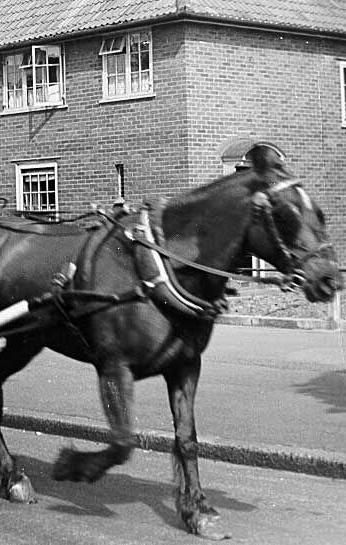
3 minute read
MOSELEY MEMORIES
COMMUNITY Is horsepower for you abstract or real? When James Watt invented the measurement “horsepower” in the 1780s on the other side of Birmingham, it was as a sales device. He wanted to show reluctant owners of coal mines that instead of employing a pair of tired nags walking in a circle round a windlass, a Boulton & Watt 4-horsepower steam engine could pump up more water from their pits, from greater depths and for as much as 24 hours at a time, while using fuel they actually produced into the bargain! And now? We measure all forms of power in watts (more usually kilowatts, because a watt is so small) and young people today have no idea about the horsepower of a car’s engine. Sad, but it is an abstract concept (by the way, 1 hp = 745.7W).The postwar world was different. For us, horse power was all too real, in all its varied forms. Daily, we had two regular rounds, when fresh milk and bread were delivered door-todoor from horses and carts. One great advantage they had was that horses are intelligent power plants, in a way that modern ideas of artificial intelligence could never match. The milkman would arrive at the bottom of Farquhar Road and take the number of bottles he needed off the cart and put them on the doorsteps. As he walked to the next stopping point, his horse would take the cart along and stop at the appropriate house. Between its ears was an information processor which learnt which houses they delivered to and which they passed. Apart from an occasional companionly word or “cluck, cluck,” the milkman gave no instructions, picked up no reins, and walked all the way round until reaching the bottom of Tudor Road, accompanied by his organic automatic vehicle. Horse-drawn carts and vans were normal to us then. For bigger loads, vehicles would have a pair of horses, with an obvious companionship between them. Best of all for us kids, though, was the real joy when the water cart arrived every six months or so. Leighton Road is on the top of the Moseley ridge and the sewers did not drain well, so they had to be flushed out on a regular basis. The main manhole was just by our house, outside Warren Avenue. A large tanker cart would come, drawn by two enormous
MOSELEY MEMORIES - REAL HORSE POWER
Advertisement
26 www.moseleyb13.com
shire horses. Each gentle giant weighed a ton or more and towered over us. We approached them tentatively, looking into the friendly mournful eyes behind their blinkers. When their nosebags were removed, they would bend their heads and allow us to pat
MOSELEY MEMORIES - REAL HORSE POWER
and stroke their muzzles with evident appreciation. The coalman’s horses never seemed to be quite the same. The coal yard was at Kings Heath station, where Topp’s Tiles and The Gym now exist. Overworked and under-loved nags would then pull more than a ton of fuel on their rounds.The dust from the slack, the fine second-quality coal, made their coats dull and filthy and no doubt went into their lungs and stomachs. Any given horse seemed to have no more than a year or so of useful working life before going to the knacker’s yard. The real joy of horse-drawn Birmingham was May Day. Every year, a fair was held at Alcester Lane’s End, where a large housing estate now stands, and ponies and full-grown horses would be drawn in from all around the city and surrounding areas. For us, the free entertainment started early in the morning as we sat outside the Post Office and watched them on their way up the Alcester Road. The main attractions were pony traps and drays. Manes and tails were plaited with coloured ribbons, shaking jingling harness decorations, and the horses enjoyed their annual outing as much as we did. Especially impressive were the proud dray horses, fed up with pulling loads of beer barrels and sacks of flour, whose manes were more magnificent than those of mere ponies. We sat and applauded them, earning an occasional wave of the hand or declarative crack of a whip, until we dragged ourselves home for dinner with sometimes unappreciative mothers complaining about how late we were. Horse power or horsepower - which gives greater satisfaction? We had no choice, of course, but we gloried in what we had. -David Spilsbury











